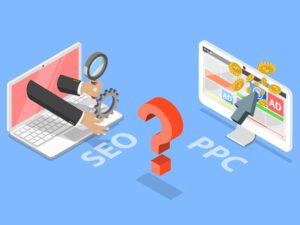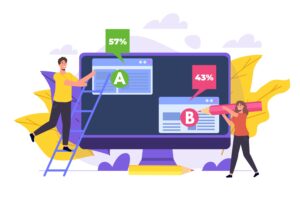Whether you’re first starting out in digital marketing – or are looking for a little more clarity on one of the most popular, but confusing, channels – then our PPC consultants are here to help.
In this blog, we’ll look at some of the most common questions we get, from ‘how to PPC’ to strategy, keywords to quality scores.
Straight from the minds of our award-winning team, we’ve scoured the top-ranking topics on PPC and broken down each section into Q’s and A’s – so make sure you keep this blog bookmarked for future reference!
How do you choose the right keywords to target?

Right at the start of your campaign, you have to choose your keywords based on words and phrases that ‘suit’ your campaign. To choose ones that are relevant to the ad group you’re building, it’s important to consider things like:
- Search volume
- Competition level
- Long-tail keywords
And most importantly, whether these terms are actually relevant to your product and audience! From here, you can then use these words in a variety of ways, helping you create exact, phrase and broad match modifiers – but more on that next.
If you don’t know where to start, tools such as Keyword Planner can help you get ideas for ad groups.
This is what one of our PPC Account Managers, Thomas McGuigan, had to say about choosing the right keywords:

“When selecting keywords for targeting, a lot of it comes down to sheer experience with understanding the level of intent behind a keyword, but for newer PPCers, or businesses trying to manage their own ads, that experience just isn’t there. What can help is putting yourself in the user’s shoes – think about how your own behaviour in shifts as you go down your own purchase journey.
When I’m looking to buy a new car, I rarely decide or buy after searching for “new cars 2024”, but that search might be the first step on a journey, so it might be a vital keyword to target for raising awareness.
But for performance targeting, a more granular/bottom-funnel-based search like “KIA Rio dealerships near me” might be more effective than “new cars 2024″, as I’ve already made some decisions about what care I want (brand: KIA, model: Rio, and I’m looking for a dealership near me – I want to buy NOW)”
What does broad match vs exact match mean?
Many PPC platforms use various match types that control how closely your ads appear for specific searches. These are based on your keywords, which links how ‘relevant’ a term might be to your campaign, depending on whether it’s an exact match to what the person is looking for – or more of a contextual search.
| Broad match | A broad match term can reach a wide audience but may lead to irrelevant clicks. |
| Phrase match | This is where a group targets a specific phrase – but allows variations before or after the chosen term. This is great for those looking to strike a balance between relevance and reach. |
| Exact match | As the name suggests, this targets only the exact keyword phrase. |
How do I avoid wasteful keywords?
No two campaigns are the same. But, it’s generally accepted that starting with a specific keyword before refining your match types can help. Then, ensuring you have enough reach – without forgetting the importance of exact matches – should help you weed out what isn’t useful. Monitoring this frequently is crucial, as is utilising the negative keywords feature on Google Ads.
Google Ads- how can you make it work for you?
In a nutshell, Google Ads works as a bidding system for PPC. From here, you choose keywords that are relevant to your campaign and industry, setting a maximum amount you want to pay should someone click your ad. When a customer searches for your chosen terms, Google holds an ‘auction’ among its advertisers, choosing the winner with the highest bid and quality scores to appear at the top of the page. You only pay if someone clicks.
Two ways to improve your quality score includes boosting your relevance, in both your ads and on your landing page. Firstly, make sure your ad text actually matches the keywords in your ad group – highlighting what users want and why your service matters. Then, check that your landing page also echoes this! If your LP isn’t relevant to your adverts, Google will mark this as useless.
Remember, user intent always comes first.
SEO vs PPC- which is better?

Historically, there’s always been a bit of a battle between SEO and PPC. After all, it entirely depends on a business’s unique goals, budget and size – as the two services work slightly differently.
SEO is more cost-effective in the long run, but doesn’t produce the same immediate – and tangible – results that PPC does.
But at Embryo, we think the two work well together. A cross-channel approach can provide optimum results, helping you obtain better SERP outcomes while increasing sales through Ads. Talk to our team for more information.
Optimisation- how can you test for performance?

Also known as split testing, A/B testing can help PPC consultants better compare different versions of ads components, to see which ones are performing better.
This is usually done by:
- Choosing a focus such as a headline, keyword or piece of ad copy
- Creating variations of said variable, like a new CTA or proposition
- Sending the variations to a similar audience split for testing
- Monitoring metrics such as conversions or clicks to see which one has performed better
Through A/B testing, you can determine which variations appeal to your audience the most, helping you craft a campaign that’s more appealing – and ultimately, more profitable.
Still got questions?
Luckily for you, our experts are full of answers. Hopefully you’ve gleaned a solid foundation from this blog on all things PPC, but if you still need help – or want our team to start a campaign from scratch, get in touch.
Our PPC consultants take a holistic approach, fully understanding you and your business’s goals as well as the industry you operate in – delivering best-in-class results.
To start your journey, why not get in touch for a personalised PPC audit from our team of experts?












